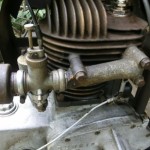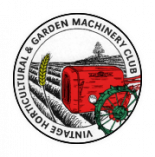Forum Replies Created
-
AuthorPosts
-
December 6, 2024 at 12:13 am #43152
 wristpinParticipant
wristpinParticipantAre we to assume that it has Villiers 125cc or 150cc Lightweight engine ? The set up is more or less the same for both and there’s plenty on of info line.
August 5, 2024 at 12:48 pm #42708 wristpinParticipant
wristpinParticipantCan’t help with the disc but I was fairly familiar with the Trantor. Another good idea that didn’t quite make it. You may know that there’s still a couple or more around in the UK that turn up at shows etc .
July 27, 2024 at 1:32 pm #42685 wristpinParticipant
wristpinParticipantUninformed guess ! The unit’s pulley is slightly out of line with the one driving it. Try a straight edge across the unit’s pulley and see how it lines up with the one driving it.
June 15, 2024 at 5:34 pm #42446 wristpinParticipant
wristpinParticipantMk 25 – maybe ?
June 11, 2024 at 7:52 pm #42434 wristpinParticipant
wristpinParticipantMine arrived today. Cover photo, what is it – can’t find any reference to it ?
June 8, 2024 at 12:08 pm #42421 wristpinParticipant
wristpinParticipantAspera were Tecumseh made under licence in Italy . Latterly called Tecnamotor a corroboration with Fiat.
June 7, 2024 at 1:03 pm #42412 wristpinParticipant
wristpinParticipantI’ve got BS parts manuals going back to the 1970s but will need the complete Model, Type and Code numbers from the engines . Theres no short cuts !!
June 3, 2024 at 4:19 pm #42392 wristpinParticipant
wristpinParticipantIf the shaft is pitted etc you can use a repair sleeve to give the new seal a smooth surface to run on. SKF Speedi Sleave is one brand.
May 24, 2024 at 3:42 pm #42326 wristpinParticipant
wristpinParticipantKohlers , as well!
May 22, 2024 at 10:08 pm #42306 wristpinParticipant
wristpinParticipantNot sure where this is going but it should be accepted that back lapping is to keep the edge on cylinders that have been properly ground. Not the process to use to recover really blunt blades.
May 16, 2024 at 4:40 pm #42270 wristpinParticipant
wristpinParticipantDefinitely suggests an issue with the distributor. Either the cap or the rotor arm, probably the cap.
May 15, 2024 at 6:31 pm #42265 wristpinParticipant
wristpinParticipantTo back lap properly use a water based paste , not oil based as in valve grinding paste. Water based so that when done you can hose it off and get rid of every trace before rotating the cylinders in the cutting direction. Leaving a trace of paste “ undoes” some of the sharpening effect gained by the back lap. In an ideal world neglected cylinders should be relief ground to create some space to retain the paste during back lapping. Applying paste to well worn cylinders results in much of the paste being thrown off before it can get to work.
A Motor Triple with four bladed units will deal with quite heavy cutting but to get a good finish reduce the forward speed to increase the clip rate aka cuts per yard. There is an art to obtain a good finish with commercial powered cylinder equipment and even more skill required in using wheel driven gang mowers.April 25, 2024 at 11:28 pm #42125 wristpinParticipant
wristpinParticipantBack in the day when the Vanguard was currently fitted to the equipment that we were selling we would experience the very occasional strange ignition issues – not starting, running on one and even not turning off on one. I remember that these issues were the subject of one or more BS service bulletins and were usually sorted by the replacement of the “diode harness” that connected the two ignition coils and prevented the them “talking / interfering” with each other. Failure of one or more diodes in the harness produced one or some of the strange symptoms listed above – frequently enough that we kept a new harness on the shelf for doing a quick diagnosis of any strange ignition issues.
As has been mention the Vanguard V twin was made in Japan – by Daihatsu I believe – and was, on the whole, a reliable sweet running engine but I guess, an expensive one to manufacture.April 19, 2024 at 10:36 am #42096 wristpinParticipant
wristpinParticipantI presume that you have the chain off the machine ? So just take it to a bearing and transmission factor who will measure it up and supply the correct link. Possibly the chain is worn and it may be the time to renew it.
April 9, 2024 at 7:51 pm #42056 wristpinParticipant
wristpinParticipantI’ve successfully repaired many tanks over the years using a heavy duty Rawlplug electric iron – no naked flame. Alternatively a large old style iron that can be heated with a blow torch well away from site.
I think that your main issue may be other areas that have not broken through yet but are lurking waiting to do so. Anyway, assuming that the rest of the tank is reasonably sound and you are satisfied that you have purged it of any fuel fumes, I would solder individual patches . Bright metal around the holes, Bakers Fluid flux and stick solder. ( not cored solder) .
That tank looks quite familiar – Ransomes? So, perhaps not too difficult to find a better one. -
AuthorPosts
